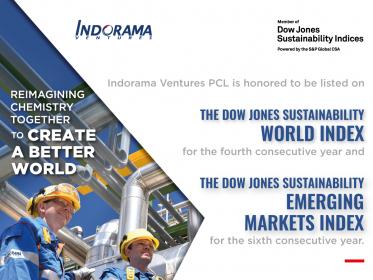Indorama Ventures listed in the Dow Jones Sustainability Indices
Indorama Ventures Public Company Limited (IVL) has been included as a member of the Dow Jones Sustainability World Index (DJSI World) for the fourth consecutive year, with a 96 percentile, and the Dow Jones Sustainability Emerging Markets Index (DJSI Emerging Markets) for the sixth successive year, with a 99 percentile. The achievement aligns with IVL's purpose of “reimagining chemistry together to create a better world.”
In 2022, S&P Global invited over 11,000 companies to participate in the Corporate Sustainability Assessment (CSA). Companies with outstanding results were then considered eligible for any DJSI. This year, there were 86 chemical companies that led the field in terms of sustainability and were eligible for the DJSI World, which tracks the performance of the top 10% of the 2,500 largest companies, and 34 chemical companies eligible for the DJSI Emerging Markets, which tracks the performance of the top 10% of the 800 largest Emerging Markets companies. Out of which, IVL is among only 10 chemical companies in the DJSI World and only 3 chemical companies in the DJSI Emerging Markets.
IVL's consistently high ranking in DJSI is driven by the company's ambition to build its industry leadership in sustainability. Under Vision 2030, IVL is committed to reducing GHG intensity by 30% and increasing renewable electricity consumption to 25%. This year, IVL also committed to setting science-based targets through the Science Based Targets Initiative (SBTi). The company also participates in the SBTi Expert Advisory Group for the chemicals industry and provides funding for developing chemical sector decarbonization solutions.
Indorama Ventures Public Company Limited





























